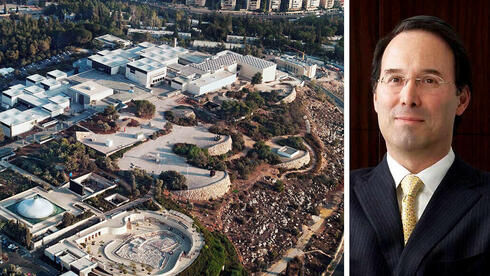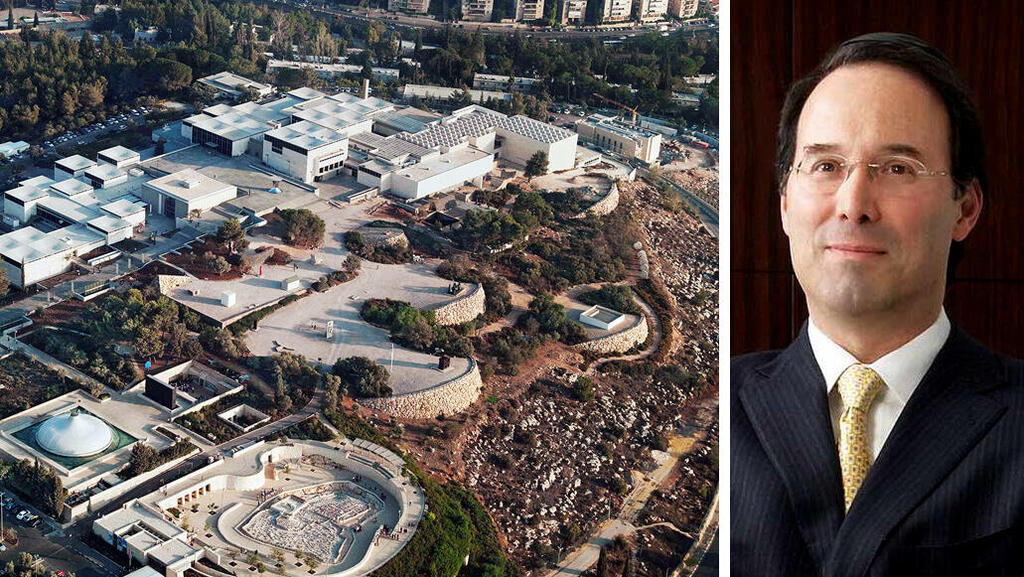
From the Great Synagogue to the King David Hotel: Who really owns Jerusalem’s land?
A billion-shekel tug-of-war unfolds between the JNF, Gary Barnett, and hundreds of residents.
Is the state about to relinquish its rights to the most sought-after land in Jerusalem, worth billions of shekels, in favor of a Jewish-American real estate developer?
Calcalist has obtained a draft agreement between the Jewish National Fund (JNF) and Extell Israel, owned by U.S. real estate tycoon Gary Barnett, which suggests that the JNF intends to relinquish its lease rights over 500 dunams of prime land in central Jerusalem in exchange for several high-profile properties currently owned by Barnett. These include iconic public assets such as the Great Synagogue and the Israel Museum. Additionally, Barnett would agree to extend the sublease agreements of approximately 900 families currently living on the land until 2100.
1 View gallery


Israel Museum and Gary Barnett
(Photos: Tim Hursley, courtesy of the Israel Museum, Jerusalem)
The incentive for Barnett? The opportunity to fast-track development plans on 12 plots of land within the 500 dunams, parcels that could accommodate thousands of apartments. Some residents, however, are alarmed. They view the deal as a betrayal by the state, one that will leave them to face an aggressive developer with massive urban renewal ambitions alone. “Extell’s motives are clear,” a tenants’ representative told Calcalist, “but why would the JNF give up property worth billions?”
From the JNF’s perspective, if an agreement is finalized, it could resolve what it sees as the most significant real estate crisis in Jerusalem. Barnett acquired the 500 dunams in 2023 for NIS 750 million from Ben David family, who had purchased the land from the Greek Orthodox Church. The land, located in the Rehavia and Talbiya neighborhoods, includes not only residential zones but also major cultural and historic landmarks such as the Israel Museum and the King David Hotel.
These lands have been leased by the JNF since 1951, initially through a 49-year agreement with the church, extended in 2000 to 2050, with an option for another 50-year extension. Exercising this option would cost tens of millions of shekels, just a fraction of the land’s current value.
Under the existing arrangement, JNF has subleased portions of the land to citizens, who then built homes. In many areas of Israel, a JNF lease is functionally equivalent to property ownership. But because the JNF itself is a lessee in this case, subleases come with expiration dates and legal ambiguity.
Barnett’s play is straightforward: make a profit by developing the 12 vacant plots and by launching a large-scale urban renewal project. To that end, he offered tenants the chance to buy their properties at NIS 2,000–5,000 per square meter, a steep discount compared to market prices, and in return, participate in the renewal project, which would provide them with new apartments and allow Barnett to build and sell many more. But many residents have rejected the offer. They believe they already own their homes and shouldn’t have to pay hundreds of thousands of shekels to join a plan they never requested.
Some have placed their hopes in the JNF to either shield them or join a legal battle against Extell. But the draft agreement suggests the JNF may be stepping aside. Over the past several months, intense negotiations have taken place between JNF chair Ifat Ovadia-Luski and representatives of Extell Israel. The result is a memorandum of understanding, classified as confidential, but obtained by Calcalist.
According to the document, in order to "ensure the status of the sub-lessees and redeem a significant portion of lands with public assets, parks, and national value," the JNF will terminate its three main lease agreements for the land. This means the JNF will not exercise its option to renew the lease past 2050 and will act as if it no longer has any claims to the land, clearing the way for Barnett’s development plans.
In return, Extell will transfer a number of properties to the JNF: the Valley of the Cross (excluding developable margins), Charles Clore Garden, the Menachem Begin Heritage Center, the Khan Theater, Bible Hill (again excluding developable zones), the Israel Museum, the Great Synagogue, and part of Heichal Shlomo. The company will also extend the sublease agreements for the 900 families until 2100.
However, the agreement does not obligate Extell to abandon its urban renewal project. Instead, it requires the company to reach “understandings” with current tenants, potentially pitting the developer directly against the residents, with the JNF no longer serving as a mediator. Tenants who choose to participate in the project may do so, but the terms will be dictated by Extell, and all will be required to pay 5.5% of the land value to extend their sublease.
The draft agreement has sparked outrage among tenant representatives, who accuse the JNF of abandoning them and surrendering assets worth billions in exchange for properties deemed valuable primarily for their symbolic and national significance. The timing also raises suspicions. For over a year, political actors from both the coalition and opposition have pushed legislation to formalize sub-lessees' rights. Residents fear the agreement is a maneuver to create irreversible facts on the ground before any law can pass. A petition is being prepared demanding that the JNF publicly disclose its official stance.
Even if the agreement is not finalized, residents warn that the mere existence of the draft could shape future legal and political realities, cementing a status quo that leaves tenants vulnerable. This, despite Barnett's earlier reassurances that “we didn’t come to Jerusalem to evict people from their homes.”
Gary Barnett is a familiar name in Israel’s capital markets. As the founder of Extell, a U.S.-based real estate firm specializing in ultra-luxury properties, he developed the famed ONE57 and Central Park Tower in Manhattan. His Israeli bond offerings, raised under the BVI model via Extell Ltd., have been consistently successful: NIS 1.4 billion in 2014, NIS 600 million in 2015, and two more series in 2021 totaling over NIS 1 billion, now trading at 6–7% yields, demonstrating market confidence in his ability to repay debt.
"Working toward the best outcome for all"
The JNF responded:
"The JNF is not managing this complex issue through the media. It is devoting substantial resources to securing the best outcome, carefully considering all interests, especially those of the tenants."
Extell Israel said:
"Extell is in active dialogue with all relevant parties to find a mutually acceptable solution. As the landowner, Extell is uniquely positioned to provide a permanent resolution that could save the JNF billions of shekels and enable tenants to remain in their homes, with immediate property value increases. Many have already accepted our generous offer. In contrast to those who seek unnecessary conflict, Extell is working toward the best outcome for all."













